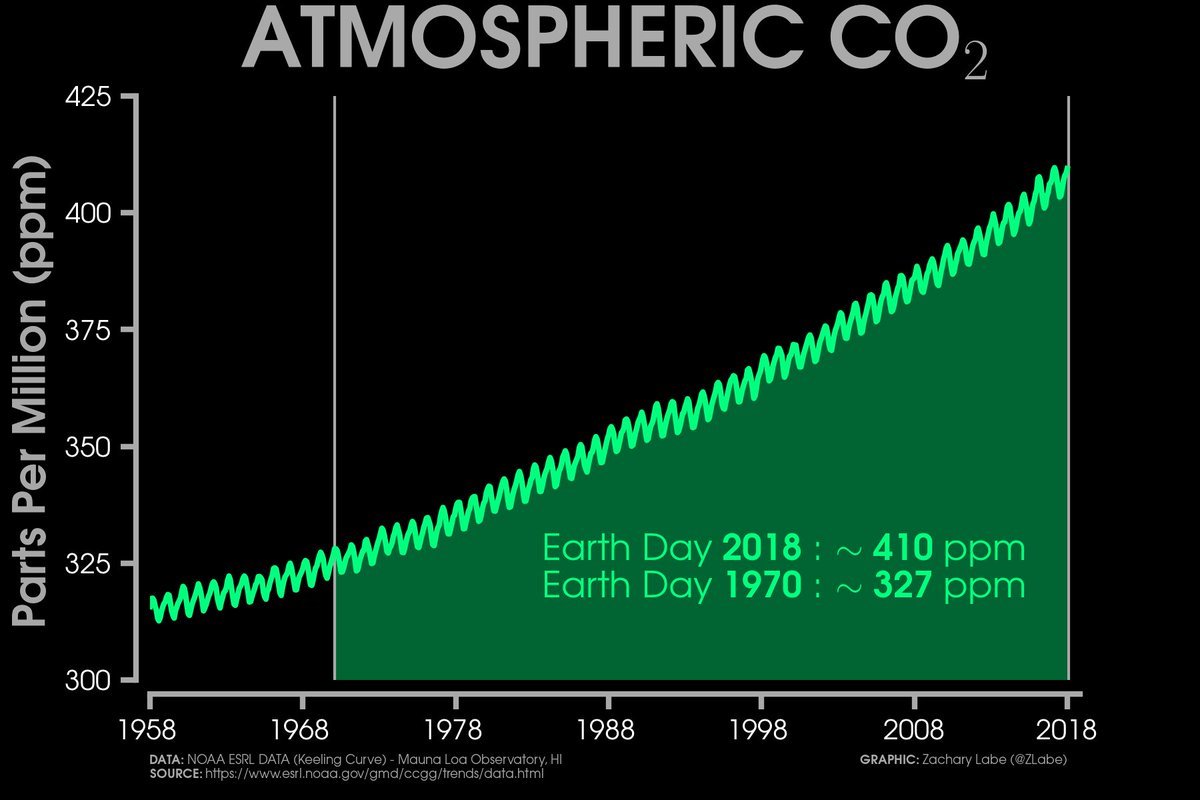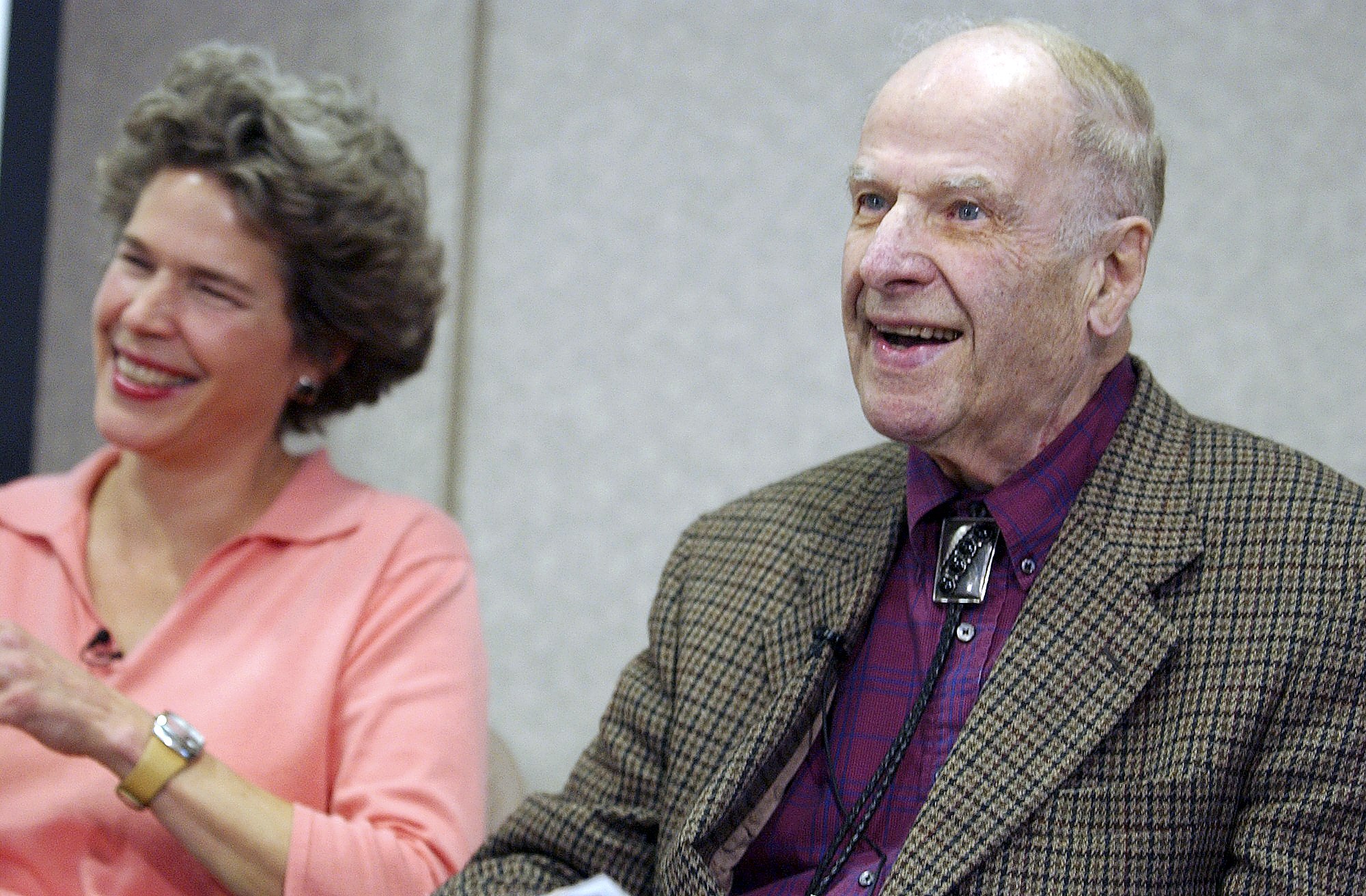Sunday April 21st… Dear Diary. The main purpose of this ongoing post will be to track United States extreme or record temperatures related to climate change. Any reports I see of ETs will be listed below the main topic of the day. I’ll refer to extreme or record temperatures as ETs (not extraterrestrials)😉
Earth Day To Earth Century
The following is a repost of what I wrote for Earth Day 2018. Sadly carbon trends in the atmosphere have not changed since then, but finally we are starting to see an increase of green energy worldwide. At the end of this essay I will tag on some news articles commenting on Earth Day 2019, which will be tomorrow:
It appears that Earth Day is being more widely celebrated with each passing year, which is fantastic. More publicity can lead to education and awareness of a fragile environment, which eventually will result, as hoped, in a harmonic balance between nature and human development. Yet, Earth Day is recognized on only one day of the year like a specific type of weather, only here for a short time. Since climate change is now the predominant environmental problem, I saw an idea, which might aid to focus on the concern. Let’s make the 21st century Earth Century as suggested by Eric Holthas:
Eric HolthausVerified account @EricHolthaus happy Earth Century, everybody!









6:29 AM – 22 Apr 2018
For the last two hundred years after the development and widespread use of the steam engine the balance or harmony between man and nature has fragmented. The Industrial Revolution blackened cities with soot by the end of the 19th century. The tumultuous 20th century saw Earth’s population boom to near 7 billion, but also with a surge in technology leading to overall better lives for most. The balance isn’t off so much that mankind can’t continue to thrive on this planet, at least not yet. Future centuries beyond the 21st can be good times for humans as we strive to move beyond this sphere onto moons and planets. We know what the existential treat is:
Zack LabeVerified account @ZLabe
Happy #EarthDay2018 weekend! Check out this website put together by @NASA about our amazing planet: https://www.nasa.gov/content/goddard/earth-day-2018 …
We all can make a difference. Every day.

8:41 PM – 21 Apr 2018 .
The 21st century will probably be a make or break 100 years for our homo sapiens civilization if not the species itself. Displacement of populations away from the coast due to sea level rise and strain on drinking water and food resources due to added heat may overwhelm mankind should the current pattern of carbon pollution not be broken the next few years. Climate change stress on society could lead to horrific wars. I’d like to see Earth Century banners and flags unfurled on a daily basis to keep all focused on the goal of keeping planetary temperature averages below 2 degrees Celsius. The Hockey Stick graph by Dr. Michael Mann, which had its 20th anniversary this Earth Day, needs to become a prominent symbol of what we are fighting against…brown energy interests that could sink what was a stable climate and environment since the dawn of civilization:
Sara Laughter @GreenAwakening “climate change is (a) real, (b) caused by burning fossil fuels, along with other human activities and (c) a grave threat if we do nothing about it. There is no legitimate scientific debate on those points…” @MichaelEMannhttp://bit.ly/2qQeKVF @SciAm

7:19 AM – 22 Apr 2018
Here is a note that I received from Al Gore’s Climate Reality Project:
Guy,
A single photo of our home from space inspired the very first Earth Day in 1970, and helped shape our modern movement to save the planet from climate change.
And as the reality of the climate crisis becomes more apparent and urgent by the day, activists like you know that every day should be Earth Day. The facts are clear that our climate is changing and that we need to take action to save our planet before it’s too late.
On this Earth Day and in the early part of this Earth Century here is a big thank you to all trying to make a difference:
Randall Gates @rgatess A few people who deserve an Earth Day Hero Award for work in education & communication on climate issues: @PaulHBeckwith@NERC_CAO@SarahEMyhre@MarkEakin@MichaelEMann@EricHolthaus@AarneClimate@KHayhoe@Climatologist49@afreedma@PeterGleick@iamscicomm@ZLabe@IceSheetMike

For Earth Day 2019, which definitely needs to be celebrated annually, I’d like to report some good progress on climate. Let’s all work hard for 365 days to make the remaining years of the 21st century, Earth’s Century, shine.
The Climate Guy
I’d like to report some very good news here, but sadly not as carbon levels spiked again during 2018. I hope to report better news on Earth Day 2020.
Here is some more Earth Day News:
https://www.nbcnews.com/mach/science/earth-day-founder-s-daughter-says-her-dad-would-be-ncna996576
Quoting and reposting this article:
Earth Day founder’s daughter says her dad would be ‘deeply distressed’ by climate inaction
“I know that he saw the right to drink clean water and breathe clean air as fundamental inalienable rights of every American.”

Earth Day was founded in 1970 by Gaylord Nelson, a former U.S. Senator from Wisconsin, pictured here with his daughter Tia Nelson in 2004.
Tom Williams / CQ-Roll Call, Inc. April 21, 2019, 6:01 AM EDT
By Denise Chow
For Tia Nelson, Earth Day is as personal as it gets.
The daughter of Gaylord Nelson, who founded Earth Day in 1970 while serving as U.S. senator from Wisconsin, Tia has spent most of her 62 years devoted to climate activism.
“Lots of people miss their parents or dear family members over the holidays. For me, Earth Day is that holiday,” she said.
Driven by sentimentality over her father’s legacy and her own outrage over climate inaction, Nelson currently serves as a managing director at the Outrider Foundation, a Madison, Wisconsin-based organization that aims to raise awareness about the risks of climate change and nuclear weapons.
But in 2004, Nelson was publicly involved in a political dust-up while serving as executive secretary of the Wisconsin Board of Commissioners of Public Lands. The incident culminated in a “gag” order that barred her from discussing climate change or addressing climate issues while on the job.
Four months later, Nelson resigned her position. But she hasn’t backed down from difficult fights.
On the eve of the 49th Earth Day, MACH chatted with Nelson about the event’s enduring legacy, how it shaped her and what her father would find most troubling if he were alive today. This interview has been edited for clarity and brevity.
MACH: What does Earth Day mean to you?
Nelson: First and foremost, I miss my dad. But I think the most powerful lesson that I am reminded of each year is the power of individual action to make a difference. It certainly was successful beyond my father’s wildest dreams. It’s really interesting to reflect on how simple, grassroots actions across the country helped create awareness and, most importantly, political will to action.
What was your father’s long-term goal for Earth Day?
I don’t think he thought of it that way. He came up with the idea because he had gone out to Santa Barbara to inspect an oil spill. At the time, it was the largest oil spill in American history. And he got on a plane and picked up a Ramparts magazine — I’ve actually found the issue — and the cover of the magazine was a story about campus protesters opposed to the U.S. involvement in Vietnam. He had struggled for years to come up with an idea that would galvanize people to have a conversation about the environment. He looked at that magazine cover and he thought to himself: These campus teach-ins are affecting the way the nation is talking about the morality and justification of that war. I’m going to call for a teach-in on the environment. His hope was to shake the political establishment out of their lethargy on the threats posed to clean water, clean air and public land in America.

To this day, I am stopped on the street or get a note from someone to tell me that Earth Day changed their life and the career choices they made. I hear this from park service employees, I hear it from professors — they remember feeling a call to action and a brightening and awareness of the issues, and many people made choices about the direction of their life based on that experience.
How did it shape you personally?
I think I was 12 for the first Earth Day. I was in junior high school and we did a cleanup on the school grounds but I don’t remember a lot beyond that. My father and I were very close. As a young person, I had a huge crush on Bobby Kennedy and would beg my father to let me go to work with him when I didn’t have school, so I walked the Senate halls with him and followed him wherever he went. I loved hanging out with him, knowing what he was doing and observing that. But it was probably the [10th anniversary] that it really sunk in to me that this had become something that would endure. It was bigger than he was and it would be a part of his legacy and endure for what I assume will be the foreseeable future.
If he was alive now, what do you think he would have to say about where we are on environmental issues?
He certainly would be deeply distressed by the further erosion of bipartisan support for environmental protections. On that first Earth Day, Congress adjourned so every member of Congress could go home to their district and participate in an Earth Day event. He would be sad and concerned about how partisan the issue has become.
I know that he saw the right to drink clean water and breathe clean air as fundamental inalienable rights of every American, and rights that the government is obligated to protect in the same way that we expect the government to provide for our public safety and national security.
As a climate change activist, what are you reflecting on this Earth Day?
We’ve seen many improvements in the environment since that first Earth Day, but we’re faced with a climate crisis that will affect the quality of life for the human species and others. It’s a question of what type of environment we want to leave to the next generation and the generations beyond. It’s a very daunting and dire situation.
I do feel like we’ve come a long way, but I also know that we’ve missed many opportunities to turn toward clean energy and improvements in land-use practices that would have prevented what all of us are beginning to experience. It kind of doesn’t matter what hometown you live in. This is not some faraway, remote threat. It’s here and it’s impacting every community in America.
Why do think there is this persistent denial of the link between human activity and climate change?
It’s important to understand that it’s not a matter of people still thinking that way. Something changed. I have videos of Sarah Palin, Mike Huckabee, Rudy Giuliani, Newt Gingrich, Mitt Romney, John McCain — all prominent Republicans — 10 years ago saying climate change is a risk to the economy and the environment. I think the question is: Why do certain leaders, largely in the Republican Party, deny something now that they didn’t deny 10 years ago?
That’s much more interesting to me because that leads you to look at a disinformation campaign run very much like tobacco companies ran their campaigns against regulating the sale of cigarettes. There’s enormous sums of money spent to spread misinformation to the public and for dirty campaign contributions to the coffers of conservative leaders who, at the end of the day, if you could get most of these guys in a private place, they’d probably tell you they actually do believe climate change is happening, But, just on ideological grounds, they want to avoid any type of government intervention in solving the crisis.
When you served as executive secretary of the Wisconsin Board of Commissioners of Public Lands, you were effectively banned from speaking about climate change on the job. How did you navigate that and what sort of lessons did you learn from that experience?
That certainly was the most stressful period in my career. I think it’s very important that people understand that when government suppresses science, it is a severe abuse of public trust. It tested me like I’d never been tested before. I just wanted to show up, do my job, stand up for my team, stand up for the agency’s work and all I said publicly for quite some time was that I want to be judged on the record of this agency.
But just as disconcerting to me as the gag order was — simultaneous with this, [then-governor of Wisconsin] Scott Walker ordered the Department of Natural Resources to take publicly financed research off their website. It was a report that had no policy advocacy in it. It was called the Wisconsin Initiative on Climate Change Impacts. It was simply a report compiling the best available science on climate change impacts in Wisconsin, like on the economy, agriculture, forestry, fisheries, etc. That suppression of science — that’s really for me the most frightening. Any efforts to suppress science or suppress voices speaking about science should be strenuously objected to, because it’s a great risk to all of us, regardless of how you feel about any particular issue. You can’t make good public policy without the best available science.
What gives you hope right now?
I think about that every morning when I wake up, because it’s a hard time to be worried about this issue in this moment in American history and politics. It tests me, especially on the eve of this Earth Day and approaching the 50th anniversary, feeling like I’ve been at this a long time. There are a couple things that give me hope. The youth-led movements around the world are inspiring. The younger generation gets it. They’re demanding leadership and they’re engaged and informed and inspiring in a way I’ve never seen in my lifetime.
Want more stories about the environment?
- High tides and sea rise make floods a part of life on the East Coast
- These 7 expeditions could reveal some of Earth’s biggest secrets
- Climate change may be dissolving the ocean floor. Here’s why we should be worried.
SIGN UP FOR THE MACH NEWSLETTER AND FOLLOW NBC NEWS MACH ON TWITTER, FACEBOOK, AND INSTAGRAM.Denise Chow
Denise Chow is a reporter and editor at NBC News MACH.
This is an interesting read:
https://www.pewresearch.org/fact-tank/2019/04/19/how-americans-see-climate-change-in-5-charts/
Also:
Here is some more climate and weather news from Easter Sunday:
(As usual, this will be a fluid post in which more information gets added during the day as it crosses my radar, crediting all who have put it on-line. Items will be archived on this site for posterity. In most instances click on the pictures of each tweet to see each article.)
Speaking of ETs. What’s this?:
(If you like these posts and my work please contribute via the PayPal widget, which has recently been added to this site. Thanks in advance for any support.)
Guy Walton- “The Climate Guy”